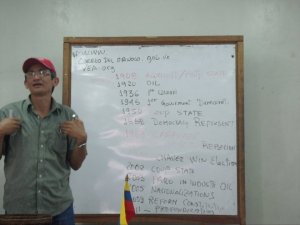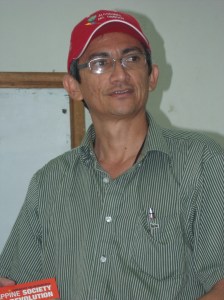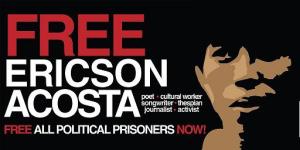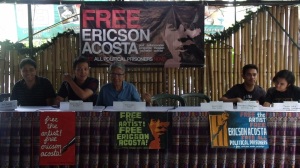 When we think of Superman — the quintessential superhero who has his residence in the United States as the mild-mannered journalist Clark Kent — we think of how he saves thousands of lives through his amazing strength and speed. But when has he ever been a defender of human rights, of collective human rights? He saves kittens trapped in trees, schoolchildren from buses tipping into abyss, passengers from airplanes and trains suddenly losing control. Rescuing people from accidents are his forte, even if occasionally he saves them from catastrophes created by Lex Luthor. He has no obvious political views, no overt political stands that go directly against forces who make a living from peddling war and weapons.
When we think of Superman — the quintessential superhero who has his residence in the United States as the mild-mannered journalist Clark Kent — we think of how he saves thousands of lives through his amazing strength and speed. But when has he ever been a defender of human rights, of collective human rights? He saves kittens trapped in trees, schoolchildren from buses tipping into abyss, passengers from airplanes and trains suddenly losing control. Rescuing people from accidents are his forte, even if occasionally he saves them from catastrophes created by Lex Luthor. He has no obvious political views, no overt political stands that go directly against forces who make a living from peddling war and weapons.
If Superman was a real individual and he acted the same way in the real world as he does in the comic books, it’s not likely that anything can be expected from him by way of fighting the genuine evil destroying the planet: US imperialism. He might even have enlisted himself alongside the US armed forces, a symbol — like another superhero Captain America — of US might, power and in this day and age when the United States government is more than ever determined to assert its supremacy in the midst of its rapidly deteriorating economy, brutality.
Superman protects the people of his adopted planet earth in many cases, individually, or but sometimes in groups. On occasion he is a defender of human rights, when he acts on behalf of the White House or the United Nations against generic terrorists. He has not, however, been a defender of their collective rights — the unseen rights that are however intrinsically part of every individual who toils for a living, whether it’s in the factories or in the fields, or as rank and file state employees in the various government agencies and institutions.
Human rights as collective rights
There is always a dialectical connection between the human rights of the individual member of society and the collective rights of a people. But “human rights,” or the rights of the individual, have become more generally accepted and codified in modern Western law than the collective “rights of peoples.” Western policy-makers, the political and cultural instrumentalities of the media and the law deliberately de-emphasize definitions of peoples’ collective rights and the manifestations of movements to defend these same rights.
In the last three decades, the United States intensified its human rights cultural expansion as the for its diplomatic campaign. It was a movement to sell the “universality” of human rights. In the mid 1970s, the the US government began using human rights as a foreign policy tool to mask its ulterior intentions. This human rights diplomacy, however, was easily exposed.
The US’ attempts, however, did not stop. It needed a human rights concept that was was acceptable to people of all countries in the world. This has given rise to a human right concept modeled on the US human rights standards–universal human rights or universalism. There is a continuing debate regarding universality in human rights as against cultural relativism, but we will leave it to the sociologists, but what we can focus on is how US imperialism uses universality, how it makes of it and the concept of peoples rights to serve its purposes.
The US, during the criminal, war-mongering government of George W. Bush utilized a twisted definition of people’s rights by subverting it under the concern of “national security;” there was the deliberate trickery, the justifying of the relentless and horrific bombings against the Iraqi people, the curtailment of civil liberties and the intensified military operation everywhere else where the US threw its weight around. Now, under the administration of Barack Obama, the same campaign against terrorism and the enemies of US imperialism continues under a different name. We have time and again seen how the cold-blooded abuse of individual rights and freedoms have taken place in the name of doctrines associated with “human rights,” such as “national security.”
But let’s backtrack a little.
Collective rights or people’s rights
In an effort to more fully elaborate and legitimize the concept of peoples’ rights, the Universal Declaration of the Rights of Peoples (also known as the Algiers Declaration) was drafted on July 4, 1976, by a gathering of distinguished jurists, political leaders, and figures of high moral authority brought together largely at the initiative of the late Italian legislator, Lelio Basso and founder of the Permanent People’s Tribunal (PPT). The document articulates the rights of a people to existence and political self-determination, to control over its resources, economic system, culture, and environment. It also elaborates the rights of minorities and calls for the protection of liberation movement combatants under the humanitarian law of war.
Since the drafting of this declaration, other important international documents have been adopted that establish a legal basis for peoples’ rights in dialectical relationship to human rights; these include the 1986 United Nations Declaration on the Right to Development and the 1981 African Charter on Human and Peoples’ Rights, both of which are discussed by van Boven.
What cannot be easily separated in the sometimes conflicting connection between human rights and people’s rights is the relationship between external and internal self-determination. According to Salvatore Senese, the General Secretary of the Permanent Peoples’ Tribunal (PPT) external self-determination is “the recognition that each people has the right to constitute itself as a nation-state or to integrate into, or federate with, an existing state.” Implied in this right, of course, is the right to defend that state.
Sense describes Internal self-determination, on the other hand, as as “the right of people to freely choose their own political, economic, and social system.” Or, as defined by Theo van Boven , the essence of internal self-determination is captured by the phrase: “the will of the people shall be the basis of authority of the government.”
(Van Boven, is a Dutch jurist and professor emeritus in international law.From 1986 to 1991, he was the UN’s Special Rapporteur on the Right to Reparation to Victims of Gross Violations of Human Rights and, from 2001 to 2004, Special Rapporteur on Torture. He is also a member of the International Commission of Jurists. From February 1994 to December 1994, he was the first registrar of the International Criminal Tribunal for the former Yugoslavia.)
Now, the term collective rights or people’s rights is more less recognized particularly among those who study, practice and defend international law. For instance, in documenting the impact of various structural adjustment programs funded by the International Monetary Fund (IMF), the World Bank (WB) and implemented by governments in developing countries, advocacy groups speak of violations against the collective rights of workers, or farmers, or indigenous peoples. The massacre of Mexican migrants attempting to enter the US by crossing the border without visas is called a violation against their human rights and their collective rights as migrants.
The most definitive reason for the acceptance of the term “collective or people’s rights” however is because of the campaign for the same in various parts of the world. These are campaigns that go beyond the demand for reforms through the legislature via amendments in laws, or through changes in presidential decrees.
Various political sociologists and political theorists are united in pointing out that the recent adoption of language in international law that asserts peoples’ rights are hands down because of the struggle of peoples in countries outside the West such as those in Southeast Asia, Latin America and Africa. Revolutions and peoples uprisings have in the last century erupted against colonial exploitation and interference.
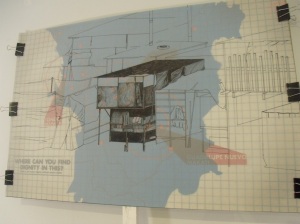 What do people of the world struggling against US imperialism want but to establish, maintain and enforce a proper relationship between these rights — individual and collective, internal and external? This is what will lead towards the creation of just and equitable society. The complex struggle to accurately define and implement that relationship is being waged throughout the world today where people’s democratic movements and national liberation movements struggle against imperialism and local reaction.
What do people of the world struggling against US imperialism want but to establish, maintain and enforce a proper relationship between these rights — individual and collective, internal and external? This is what will lead towards the creation of just and equitable society. The complex struggle to accurately define and implement that relationship is being waged throughout the world today where people’s democratic movements and national liberation movements struggle against imperialism and local reaction.
What liberation movements want is to comprehensively and decisively correct imbalances between individual and collective rights and needs.
I’m not saying that individual rights be neglected as we pursue collective rights, but cannot stress enough in these days where the cultural offensive of imperialism is to stress individuality and an I-me-mine mentality that the rights of the collective are as important if not even more so. Human rights, even as they are applied to all individuals, should also be considered as part of a whole series of rights — collective or people’s rights.
This is to ensure that when one speaks of human rights, one does not only consider violations against the physical sanctity and the political security of individuals as attacks against human rights. One must also see that attacks against rights to enjoy just and living wages, job security, and ancestral lands, education, health and housing are also attacks against human rights and collective rights : individuals are members of a sector and as a class, and as such, comprise part of society alongside other sectors, other classes.
Concretely let’s consider Cuba. In the last sixty years, Cuba’s adamant defense of its people’s right to self-determination is what has allowed for the realization of its people’s right to education, housing, and health care.The Cuban government’s struggle against imperialism is the struggle of its people for national independence and it is what ensures that Cuba is able to focus on the creation, running and maintenance of internal systems that serve the needs of the Cuban people. Who has not heard of how Cuba has doctors for every neighborhood block? It’s healthcare system is the best in the world.
Built on a strong foundation in primary care, Cuba provides comprehensive health care to all residents of the island. Given extremely limited resources Cuba has amassed an impressive set of accomplishments in public health. Despite Average life expectancy is 77.5 years, compared to 78.1 years in the United States, and infant and child mortality rates match or beat those of the US. There’s one doctor for every 170 people, more than twice the per-capita U.S. average.
This cannot be said of the United States. For the last decade, the world has witnessed how US unemployment rates began to steadily increase, pulling in their wake the number of homeless people and those denied to live on welfare checks which in turn have also decreased in value because of severe cutbacks on social security benefits. The slogan here is “sink or swim,” and there is not one sector of the working people in the US which has not been affected.
In no other time in history than in the last ten years has the rest of the world questioned the US government’s commitment to human rights when it has launched a global war against terrorism where in the process it committed genocide again and again and again. In its own states the US government continues to undermine and attack the rights of Black, Hispanic, and Native American, millions of people tied to permanent poverty and hopelessness.
Friends and comrades, some of the most important developments that contribute to the shaping and redefinition of the relationships between the individual, a people, and political power are taking place in the countries where there are national liberation movements, armed struggles seeking socialist changes.
Salvatore Senese said that the contradictions that exist between human rights and collective rights are part and parcel of the global crisis — workers in developing countries are being pitted against workers in advanced economies; political dissidents championing the cause of US imperialism in countries against US imperialism; farmers in the Third World battling against the entry of produce grown by farmers from agriculturally developed countries.
Where we begin to recognize and assert human rights, we also begin fight for collective rights. Concepts such as democracy, human rights, and self-determination are neither universal nor politically neutral, and by concretely analyzing the political and economic dimensions surrounding global developments, we will see how there really is one central focus of struggle in the end: the working people of the world against imperialism and its agents.
Domination, Self-Determination, and Liberation
Now we arrive at the crux of the matter.
It is impossible to address the issue of human rights and peoples’ rights without discussing the matter of imperialism and foreign intervention. As Prof. Richard Anderson Falk (Richard Anderson Falk is an American professor emeritus of international law at Princeton University, the author or co-author of 20 books and the editor or co-editor of another 20 books, speaker, activist on world affairs, and an appointee to two United Nations positions on the Palestinian territories.
and Francis Boyle argued (Boyle is a harsh critic of the foreign policy of former American President George W. Bush. In 2007 Boyle denounced the “ongoing criminal activities perpetrated by the Bush Jr. administration and its nefarious foreign accomplices in allied governments such as in Britain, Australia, Japan, South Korea, Georgia, etc.” He also stated that the Bush administration “would welcome the outbreak of a Third World War” and “is fully prepared to use tactical nuclear weapons against Muslim and Arab states and peoples.” He also stated that American treatment of Muslims and Arabs since the attacks of September 11, 2001 is “almost to the same extent that America inflicted upon the Japanese and Japanese Americans after Pearl Harbor.” He concluded his speech by calling on American lawyers to “lead the fight against the Bush Jr. dictatorship.” Boyle has requested that the International Criminal Court Prosecutor obtain International Arrest Warrants for George W. Bush, Dick Cheney, Donald Rumsfeld, George Tenet, Condoleezza Rice, and Alberto Gonzales.), the struggle to uphold human rights all over the world is a struggle not only in their defense but to fight against the forces that undermine them.
As is clear to everyone here, the United States government continues to play the leading role in obstructing human rights and peoples’ rights all over the world. This through its refusal to ratify major international treaties or to abide by existing international law; and through its conduct of covert and overt interventions against various resisting governments and movements. It consistently involves itself in global affairs because of its extensive economic interests, and never has its interference benefitted the cause of social justice in the countries it interferes in.
The US is able to wield its military might all over the world because of the existence of its bases and installations globally. Historian and journalist Nick Turse has said that there are no less than 1,077 US bases or sites in foreign countries. The US Defense budget is now about the equal to military spending in all other countries combined, and since 9/11, military and security expenditures have soared 119 percent.
Only recently, Obama has rejected Palestinian plans to seek statehood at the United Nations. He said that Washington’s commitment to Israel’s security is “ironclad”, and that the US will stand up against efforts to single Israel out at the UN or in any international forum “because Israel’s legitimacy is not a matter for debate.” The US Congress is also virulently against the plans for unification between Hamas and Fatah, two Palestinian movements and opposing political factions now seeking to unite in the call for a Palestinian state.
Those who have monitoring the Palestinian-Israeli conflict know how the Palestinian people have long struggled for sovereignty and recognition, but it’s only been in the recent years that their demands focused on unity as a means towards the establishment of a Palestinian State. Palestinian youth have been inspired by activists in Tunisia and Egypt and last May organized and networked Palestinians from Gaza, the West Bank, and refugee camps in Syria, Lebanon, and Jordan. Their protests and other activities aimed to call for unity between Hamas and Fatah to unite not as political parties, but as Palestinians. These protests were barely reported in any media outlets, and now the US is actively against any unity between the two factions.
Pro-Israeli and anti-Palestinian lobby groups in the US are known to wield major influence in both US legislative bodies. These lobby groups have members in important committees that influence and set the White House’s fund appropriations and foreign policy. US Congress representatives receive campaign funds and other support from the Israeli lobby establishment, including, according to reports, regular all-paid luxury tours to Israel for so lawmakers can meet with senior Israeli officials so they can supposedly be briefed on Israel’s security requirements in the region. Israel is the largest recipient of US foreign aid, receiving more than $3 billion annually or about $8 million every day.
The US also proclaims itself as a champion of human rights as its reason for involving itself in the conflicts in southern African states where the citizenry are demanding the ouster of corrupt and puppet governments the US placed in power.
As the people of Egypt filled the streets in protest and in the process many were being killed, beaten, or rounded up in the streets of Cairo, US Vice President Joe Biden defended Mubarak.
He said, and I quote” Look, Mubarak has been an ally of ours in a number of things and he’s been very responsible on, relative to geopolitical interests in the region: Middle East peace efforts, the actions Egypt has taken relative to normalizing the relationship with Israel. I would not refer to him as a dictator.” (PBS Newshour, Newsmaker Interview, January 27, 2011)
The US has had Mubarak for a reliable ally for a long time, and it has showered the Mubarak regime with billions of dollars in aid. As the revelations from WikiLeaks exposed, the US government and its past administrations have never been blind to Mubarak regime’s fascism and corruption. Mubarak has been fully complicit in aiding Israel in its crimes against Palestinians and this has been said to be one of the main reasons behind the US’ relentless support for regime.
US imperialism also stands in the way against self-determination and democratic rights in Latin American countries. There’s already a very long list detailing the crimes US imperialism committed against the peoples of Latin America. To name a few, there’s the 1983 invasion of Grenada; the the 1985 invasion of Panama; the Contra war it instigated in Nicaragua, the counter-insurgency war in El Salvador. More recent examples of the US’ continuing attacks included the counter-insurgency war in Columbia where it aids the puppet government; the continuing threats against the nationalist government of Hugo Chavez in Venezuela; the 50 year old illegal trade embargo against Cuba and the repeated terrorist attacks against that country; and the ongoing US/UN military occupation of Haiti.
Recent reports have it that Obama administration has laid down sanctions on Venezuela’s state oil company Pdvsa, and the people of Venezuela have called the calling the sanctions an “imperialist attack.”
The U.S. State Department enforced the sanctions in an attempt to put further pressure on Iran to halt its nuclear program by penalizing companies which continue to trade with it. Between December 2010 and March 2011 Venezuela, which has friendly bilateral relations with Iran, exported $50 million worth of a fuel additive to the latter.
The US said that it wants to wanted to send a “clear message” to companies which continue to “irresponsibly support Iran. Iran in the meantime maintains that its nuclear program is purely to supply energy to the public, but the US claims that Iran is developing nuclear weapons.
The Iranian government has previously accused “nuclear nations” led by the US of “monopolizing” science and technology in order to protect their own interests and to stop other countries from the “peaceful use of nuclear energy.”
In recent years, however, heroic struggles of the working people all over the world have been gaining ground as liberation movements wage war against imperialism and its local agents. There are liberation movements in n Ecuador, Bolivia, Venezuela, Peru, Brazil, Argentina, Paraguay comprehensive movements for social and economic emancipation and directly against US imperialist domination.
There are also the permanent targets other US’ aggressive and interventionist policies who continue to resist: Cuba and People’s Democratic Republic of Korea. They declare not only their national independence but also the socialist aspirations of their respective peoples in fighting against US acts of military and economic aggression and intervention. Then there’s Palestine, Syria, and Iran and others that invoke national independence and oppose the abusive demands and impositions of the US on their economies.
According to James Petras (Rethinking Imperialist Theory), between 2000-2005 major popular upheavals and mass mobilizations took place In Latin America , overthrowing incumbent neo-liberal client regimes, calling for the renationalization of privatized firms, the renunciation of the foreign debt, radical agrarian reforms and income redistribution. Neo-liberal ideology was totally discredited and US foreign policy was subject to a thorough discredit. Anti-imperialist, if not anti-capitalist ideology held sway among broad sectors of the working, middle and even elements of the political class.
The struggles in these countries are not defined as struggles for human rights alone, but for people’s collective rights – an encompassing, and carrying deep within them the political undertones of militancy and even revolution. The campaigns being waged are not only in defense of human rights, but for national liberation, sovereignty, independence and true democracy based on justice.
Democracy and Rights: Redefining the Terms
There is always the threat of war when the old world lashes out against all attempts to establish a new world. The old world is what we know today where monopoly capitalism struggles to revive itself but fails again and again to do. The new world is the one where we seek to create . The old world led by US imperialism and its cohorts seek to fold, staple and mutilate dissent in all forms and hence worsen already rampant social, economic, political, and cultural disorder. But there is no stopping the new world from emerging.
 As Prof. Jose Ma. Sison, the chairman of the International League of Peoples’ Struggles (ILPS)is always affirming, the days of imperialism are numbered. It’s of course wrong for us to assume that just because this inevitably so, we can all relax. On the contrary, greater effort is required of all those in peoples movements and national liberation movements all over the world to hasten the death of imperialism and usher the birth of victory of struggles of the oppressed and working people. Hence there is a need to strengthen anti-imperialist national liberation movements in all countries.
As Prof. Jose Ma. Sison, the chairman of the International League of Peoples’ Struggles (ILPS)is always affirming, the days of imperialism are numbered. It’s of course wrong for us to assume that just because this inevitably so, we can all relax. On the contrary, greater effort is required of all those in peoples movements and national liberation movements all over the world to hasten the death of imperialism and usher the birth of victory of struggles of the oppressed and working people. Hence there is a need to strengthen anti-imperialist national liberation movements in all countries.
The present Philippine liberation movement of the broad masses and different forces of the Filipino people is represented by the National Democratic Front of the Philippines, the Communist Party of the Philippines, the New People’s Army and the other revolutionary organizations in the Philippines. They comprise what qualifies as a legitimate national liberation movement from the point of view of international law, particularly international humanitarian law.
In the last four years of their existence, these organizations that lead the national liberation movement in the Philippines have made consistent and firm representations. When they entered into peace negotiations with the Government of the Philippines, their status was further elevated as their participation in the talks expressly announced them as a co-belligerent. The NDFP, the CPP and the NPA have proven themselves to possess a strong and responsible command, with readiness and willingness to assume their responsibilities in accordance with international human rights and humanitarian law.
What makes the national liberation movement in the Philippines a force to contend with its army. The NPA continues to strengthen itself as a fighting force, and successfully meets the requirements it has set for itself: continuous political and military training, building the organs of political power and the mass organizations, carrying out land reform and other campaigns and intensifying tactical offensives.
Members of the people’s army are trained beyond military skills, but as importantly organizing skills. They are equipped in knowledge to implement a sound economic program, and their commitment is bolstered by the determination to overcome individual and collective weaknesses. Being directly under the command of the Communist Party of the Philippines, the New People’s Army sees the revolutionary war’s eventual victory to to the systematic processes of “concrete analysis of concrete conditions” vis-à-vis the strategic and tactical formulation of Marxism-Leninism-Maoism on the prevailing semi-colonial and semi-feudal situation in the Philippines.
All throughout the conduct of its ideological, political and organizational tasks, the NPA affirms to unite completely with the CPP, and revolutionary people’s organizations among the peasants, workers, ethnic groups, women, youth students and other marginalized groups, and the whole people in the advancement of people’s war in the Philippines.
The NPA had exceedingly small and modest beginnings, but it has reached its current level of development mainly through self-reliance. It has achieved countless victories on many front because of the inexhaustible participation and whole-hearted support of the Filipino people. The NPA undertakes production for a portion of its needs in addition to the contributions made by the masses. The need for firearms and other war materiel is met through successful tactical offensives against enemy forces. The NPA is also the effective instrument for enforcing the taxation policy of the people’s democratic government.
Never before in the the history of this country has there ever been an army like the NPA. It is resolute, resourceful and vigorous ]in waging the people’s war to complete the new-democratic revolution. For this reason the Filipino people cherish the NPA as their own revolutionary army, and in supporting it they also fight for their own national and social liberation.
To win the people’s war in the Philippines is the greatest contribution the national liberation movement in the Philippines can make to the struggle of all oppressed peoples in the world against imperialism. Even now the NDFP remains steadfast in its commitment to proceed with peace negotiations with the Government of the Philippines (GPH). It’s the will and commitment to defend the collective rights of the Filipino people that strengthens the NDFP and its correct assessment of what will bring a just and lasting peace to the Philippines. This is why the NDFP was determined to ensure the creation of the Comprehensive Agreement on Respect for Human Rights and International Humanitarian Law (CARHRIHL); and this is why it is also assiduously working for the creation of an agreement for socio-economic reforms.
Fight imperialism for a just and humane society
Friends and comrades, all the destructive forces of imperialism — its wont to destroy all that is sacred to life and maintaining, improving and beautifying life –have their opposite but greater match in the righteousness, creativity, sophistication and will of national liberation movements.
The innate power of social forces to redefine reality is a theme addressed by Eduardo Galeano in a discussion of democracy in Latin America:
“This democracy won’t be any truer because it looks more like the models of Western Europe or Eastern Europe, or anywhere else. It will be true democracy to the extent that it unleashes the participatory will and creative energy of the people, which is an energy for the transformation of reality. Because that which copies best is not best; best is that which best creates, even when mistakes are made in creating.”
Galeano makes the stand that those who participate in struggles for social change are able to survive even the darkest of moments and return with sharpened intelligence, greater clarity, and stronger will. He also issues a challenge to the all those who think and feel to use their common sense against the tragedies inflicted by imperialism:
“Many of the worst crimes and injustices on earth are carried out through these three international organisations: the IMF, World Bank and WTO. Their victims are the disappeared – not the people who vanished under military dictatorships but the things that have gone under democracy. Over the past few years, my country, Uruguay, has seen jobs, decent wages, pensions, factories, lands and even rivers disappear. The story is the same all over Latin America and in many other regions. We are even seeing our children disappear, reversing their forebears’ emigrant dreams and heading for Europe and elsewhere. Does common sense tell us that we have to endure avoidable suffering and accept these tragedies as the work of fate?”— (Superducks and underducks)
Mexican philologist González Casanova (Pablo González Casanova is an outstanding Mexican critical sociologist and decorated by UNESCO in the 2003 with the Premium International Jose Martí by his defense of the identity of indigenous people of Latin America. Also he is known to defend the Cuban Revolution and to see the political system of Cuba like democratic.) likewise describes the process of internal transformation that has accompanied the struggles of the liberation forces:
“Having experienced defeats and aware of their weaknesses, they are interested in rethinking the role of the working class in the revolutionary processes, the role of class and vanguard, the role of the material base, the urban base, the rural base, and of the production and reproduction of life itself as key to the revolutionary struggle….”
 The challenge that always lies in the path of individuals and groups alike who want to consider themselves progressive or even revolutionary is the rethinking of their ideas of regarding the nature of human rights and the balance between individual and collective rights. To see that the greatest struggle of humanity is to champion the cause of the poor and working people and to end the oppression and exploitation. It is their human rights that need to be upheld, because in doing so, the collective rights of the rest of society are defended.
The challenge that always lies in the path of individuals and groups alike who want to consider themselves progressive or even revolutionary is the rethinking of their ideas of regarding the nature of human rights and the balance between individual and collective rights. To see that the greatest struggle of humanity is to champion the cause of the poor and working people and to end the oppression and exploitation. It is their human rights that need to be upheld, because in doing so, the collective rights of the rest of society are defended.
Often these are issues that prove to be at the core of what moves individuals forward or forces them to remain static or worse, tip towards the direction where reaction pretends to be liberal. Recognizing that human rights can only truly be upheld in a society where collective rights are recognized and defended are central to the effectiveness of the organizations and movements struggling for the creation of truly democratic societies.
Clearly, many complex and critical questions regarding human rights and peoples’ rights have been raised. One of the great strengths of organizations like the ILPS is that it brings together activists and intellectuals from many corners of the globe in dialogue about such concerns.
Lastly, I would like to leave you with something Arundhati Roy wrote about India and how the people of India need to fight against the global war of terror because of its destructive impact on the civil rights in India. US imperialism and the Coalition Against Terror, she said, created “ congenial international atmosphere” for the ghastly debut of fascism in India. Her words apply for the rest of the world today where people assert their collective rights for genuine freedom and true democracy against imperialism:
“Fascism is a about the slow, steady infiltration of all the instruments of state power. It is about the slow erosion of civil liberties, about unspectacular day-to-day injustices. Fighting it means fighting to win back the minds and hearts of people. Fighting it does not mean asking for the religious schools to be banned, it means working towards the day when they are voluntarily abandoned as bad ideas. It means keeping an eagle eye on public institutions and demanding accountability. It means putting your ear to the ground and listening to the whispering of the truly powerless. It means giving a forum to the myriad voices from the hundreds of resistance movements across the world which are speaking about real things – about bonded labour, marital rape, sexual preferences, women’s wages, uranium dumping, unsustainable mining, weavers’ woes, farmers’ worries. It means fighting displacement and dispossession and the relentless, everyday violence of abject poverty.”
The relentless attacks against the collective human rights of all the poor and working people in the world by imperialism more than clearly defines for us what humanity’s struggle must be about. We cannot be true liberators unless the liberation we will achieve guarantees to all the rights of the poor and working people to life, health, happiness and development. Our liberation would be untrue to itself if it did not. There is always a light shining through an endless pitch black night. Let us all pledge to commit to hope and fight against despair and all that lies between us and a free and prosperous country and world where workers and farmers do not live as slaves, where intellectuals create and pay tribute to those who give shape and form to their visions, and where we can begin to realize the fullest and best potential of our humanity.





